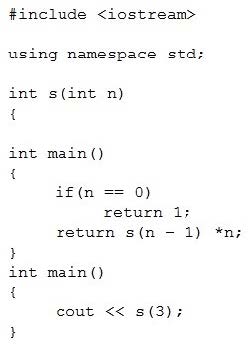Exam Details
Exam Code
:CPA-21-02Exam Name
:CPA - C++ Certified Associate ProgrammerCertification
:C++ Institute CertificationsVendor
:C++ InstituteTotal Questions
:257 Q&AsLast Updated
:Jul 18, 2025
C++ Institute C++ Institute Certifications CPA-21-02 Questions & Answers
-
Question 231:
What happens when you attempt to compile and run the following code?
#include
#include
using namespace std;
class A {
public:
A() { cout << "A no parameters";}
A(string s) { cout << "A string parameter";}
A(A anda) { cout << "A object A parameter";}
};
class B : public A {
public:
B() { cout << "B no parameters";}
B(string s) { cout << "B string parameter";}
};
int main () {
A a1;
A a2("Test");
B b1("Alan");
return 0;
}
A. It prints: A no parametersA string parameterA no parametersB string parameter
B. It prints: A no parametersB string parameter
C. It prints: B string parameter
D. It prints: B no parameter
-
Question 232:
What happens when you attempt to compile and run the following code?
#include
#include
using namespace std;
class A {
int x;
protected:
int y;
public:
int z;
A() { x=1; y=2; z=3; }
};
class B : public A {
string z;
public:
void set() { y = 4; z = "John"; }
void Print() { cout << y << A::z; }
};
int main () {
B b;
b.set();
b.Print();
return 0;
}
A. It prints: 4John
B. It prints: 2John
C. It prints: 23
D. It prints: 43
-
Question 233:
What happens when you attempt to compile and run the following code?
#include
using namespace std;
class A {
public :
void print() {
cout << "A ";
}
};
class B {
public :
void print() {
cout << "B ";
}
};
int main() {
B sc[2];
B *bc = (B*)sc;
for (int i=0; i<2;i++)
(bc++)->print();
return 0;
}
A. It prints: A A
B. It prints: B B
C. It prints: A B
D. It prints: B A
-
Question 234:
What happens when you attempt to compile and run the following code?
#include
using namespace std;
class A {
public:
int x;
A() { x=0;}
};
class B : protected A {
public:
int y;
using A::x;
B(int y) {this?>y = y;}
void Print() { cout << x << y; }
};
int main () {
B b(5);
b.Print();
return 0;
}
A. It prints: 05
B. It prints: 0
C. It prints: 5
D. It prints: 15
-
Question 235:
What is the output of the program?
#include
using namespace std;
#define PRINT(i) cout<
int main()
{
int y=2, z=3;
PRINT(y);
PRINT(z);
return 0;
}
A. It prints: 123
B. It prints: 23
C. It prints: 3
D. It prints: 2
-
Question 236:
What will be the output of the program?
#include
#include
using namespace std;
int fun(int);
int main()
{
float k=3;
k = fun(k);
cout<
return 0;
}
int fun(int i)
{
i++;
return i;
}
A. 3
B. 5
C. 4
D. 5
-
Question 237:
What happens when you attempt to compile and run the following code? #include
using namespace std;
int main()
{
int *a= new int;
*a=100;
cout << *a;
delete a;
}
A. It prints: 1
B. It prints: 100
C. It prints: 0
D. It prints: 10
-
Question 238:
Which code, inserted at line 8, generates the output "100"?
#include
using namespace std;
int fun(int);
int main()
{
int *x = new int;
*x=10;
//insert code here
return 0;
}
int fun(int i)
{
return i*i;
}
A. cout << fun(*x) ;
B. cout << fun(10);
C. cout << fun(5) ;
D. cout << fun(y) ;
-
Question 239:
What happens when you attempt to compile and run the following code?

A. It prints: 3
B. It prints: 4
C. It prints: 0
D. It prints: 6
-
Question 240:
What is the output of the program?
#include
#include
using namespace std;
struct t
{
int tab[2];
};
class First
{
struct t u;
public:
First() {
u.tab[0] = 1;
u.tab[1] = 0;
}
void Print(){
cout << u.tab[0] << " " << u.tab[1];
}
};
int main()
{
First t;
t.Print();
}
A. It prints: 2 2
B. It prints: 1 1
C. It prints: 1 0
D. It prints: 0 0
Tips on How to Prepare for the Exams
Nowadays, the certification exams become more and more important and required by more and more enterprises when applying for a job. But how to prepare for the exam effectively? How to prepare for the exam in a short time with less efforts? How to get a ideal result and how to find the most reliable resources? Here on Vcedump.com, you will find all the answers. Vcedump.com provide not only C++ Institute exam questions, answers and explanations but also complete assistance on your exam preparation and certification application. If you are confused on your CPA-21-02 exam preparations and C++ Institute certification application, do not hesitate to visit our Vcedump.com to find your solutions here.